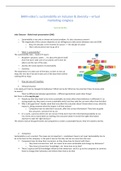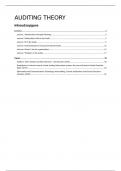Samenvatting
Samenvatting BAM-video's - Marketingbeleid -2022
- Vak
- Instelling
Dit is een volledige samenvatting van het online congres BAM. Normaal moet je €10 betalen voor het kunnen kijken van de video's (4 uur lang). Voor 7,5€ bespaar je veel tijd en geld.
[Meer zien]





